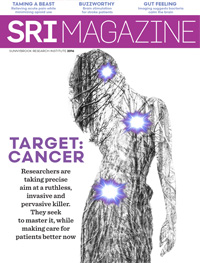- Studies help blood cancer patients make treatment decisions
- Overcoming treatment resistance in cancer
- How can we speed up biopsy for thyroid cancer?
- Targeted therapy for lung cancer helps stem progression and is easier to tolerate
- A new kind of radiotherapy kills brain tumours with pinpoint precision
- Individualizing breast cancer therapy
- "Bespoke" prostate cancer treatment
- A tapestry of clinical trials
- Stomach, pancreatic and other upper GI cancers: new findings are providing much-needed treatment guidance
- Colorectal cancer advances
- Specialist care critical in treating vulvar cancer
- Immunotherapy for melanoma works over the long term: study
- Avoiding invasive end-of-life care in cancer
Other features
Messages
Digest
- Breaching the blood-brain barrier noninvasively: an historic first
- Getting timely post-emerg care: what best predicts It?
- Special delivery
- Caring for caregivers critical
- Aerobic exercise as a “biological probe” in bipolar disorder
- Surveying new territory: physician-assisted death and amyotrophic lateral sclerosis
Short stories
- Have gestational diabetes? Timing of delivery matters
- Optimizing rehab for stroke patients
- Innovative technologies need early-stage investment
Connections
Ask a scientist

"Talk about tough days: Your results didn’t pan out. You didn’t get the grant. What do you do to decompress after days like this?"
Edited by Stephanie Roberts
David Andrews
When I really need to de-stress and the opportunity arises, live music is my destination of choice. Most recently it was Stick Men live at the Mod Club; before that, King Crimson—I am in the audience in the pictures King Crimson bassist Tony Levin took from the stage on November 19 and 21, 2015, their first appearances in Toronto since 2003.
If recorded music is the agenda, then I have a choice of about 1500 CDs, 1000 vinyl LPs [aka records] and about 100 live shows that I have recorded over the years. Right now I am ripping all the CDs and recordings of live shows onto a server, and have wired the house for sound so that I can control the music in every room with my phone. But it’s when I head for my ‘fancy’ stereo in the basement that it can get pretty loud—and is ultimately most cathartic.
Andrews, director of Biological Sciences at Sunnybrook Research Institute (SRI), recently was awarded close to $2.7 million over seven years in the first ever Canadian Institutes of Health Research (CIHR) Foundation Scheme competition. Of the 1,375 applications CIHR received, 150 were successful. Andrews is studying the assembly of apoptotic and protein complexes on subcellular membranes.
Jean Gariépy
Anticipating results for grant competitions or manuscript submissions represent a constant source of stress that is in part linked to the ever-changing mood of academic research. This ‘intangible’ issue has been more recently accentuated by a major shift in the way research is being evaluated and funded in Canada. For instance, projects are now being ranked by CIHR reviewers who typically lack the overall level of expertise of past expert panels.
One coping mechanism is to ensure that your research program remains exciting, since new concepts and ideas are what attract new recruits and, to some extent, are what appeal to panel members that are less familiar with our research areas. Finding talented, dedicated scientists is probably the single most important task that I need to focus on. It dictates the overall success of the laboratory, makes for a great working environment and reduces my stress level.
Gariépy is a senior scientist in Physical Sciences at SRI. He is midway through a five-year CIHR grant of just under $600,000 for his work in designing novel anti-inflammatory agents. He is generating synthetic, targeted biomolecules to block or dampen uncontrolled immune responses.
Thérèse Stukel
This is an interesting question since it’s what I coach my graduate students and junior faculty on. My first major research setback was as a PhD student when I spent four months proving a theorem that turned out to be wrong, because the second line of the proof was wrong! It took me four months to recover confidence, so I lost eight months’ worth of time.
After a setback, I wake up the next morning and just get back to work. I now anticipate that there will be regular setbacks so these have become part of the ebb and flow of doing research. In fact, they often spur me on to greater heights, to ideas I hadn’t originally thought of. Research is a destination, but its pursuit is a journey all of whose disparate aspects must be embraced in order to be a good scientist.
Stukel is a scientist in Evaluative Clinical Sciences at SRI. She was awarded more than $1.8 million over seven years through the same CIHR Foundation Scheme pilot as Andrews. She is measuring and evaluating the performance of integrated health systems for patients with complex chronic disease.
Photos: (left) Curtis Lantinga, (centre) Nation Wong, (right) Doug Nicholson




- << Connected |
- Previous: All for one •
- Next: Quick statistics
- |Through the wormhole >>






